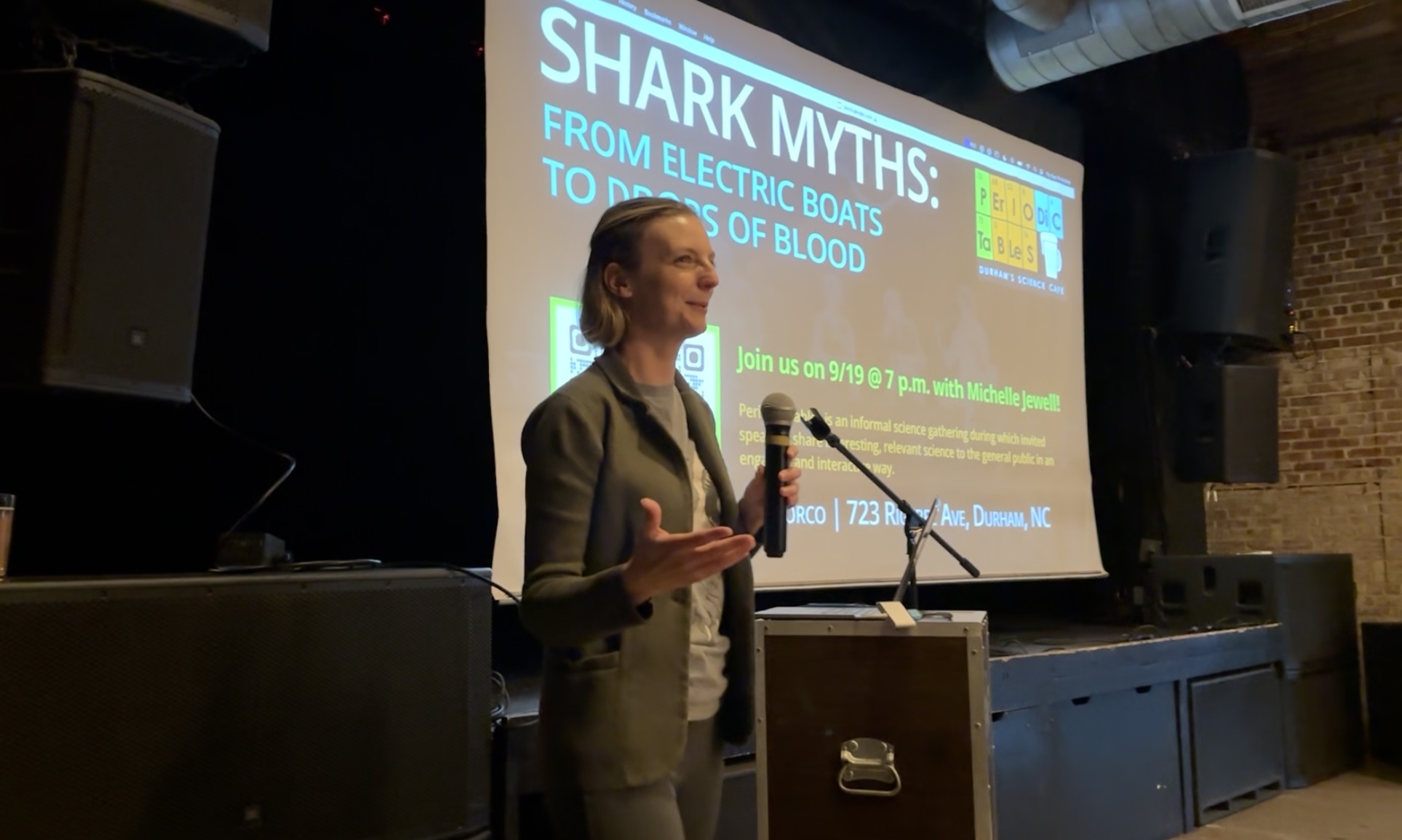It’s a Thursday evening in Durham and a little “Friday feel” permeates the food and entertainment hub surrounding Motorco Music Hall. Walkers on the sidewalk. Diners at outside tables. People grabbing drinks after work. Inside Motorco a few dozen people have gathered by the stage, but not to see a buzzworthy indie band. Rather, great white shark specialist and science communicator Michelle Jewell takes the microphone.
“What’s your favorite shark?” a young girl asks at one point.
“Not to be basic, but it’s the species I study,” Jewell says. She’s an entertainer, but in everything funny or clever she says is a nucleus of scientific fact. Great whites, she notes, are smart. “You can watch them suss you out.”
This is Periodic Tables, Duke Science and Society’s science café, and Jewell is a seasoned communicator who knows she’s there to entertain a lay audience. Her presentation centers on shark myths. Sometimes it’s funny. Sometimes it’s ridiculous and sometimes, such as when Jewell shares a picture of the conveyer belt of teeth inside a shark’s gums, it’s a little gnarly, which keeps the audience locked in. Yet for each myth Jewell addresses, she shares research-based facts about the predators she studies.
Indeed, this is the mission of Periodic Tables: spreading science into the community in a way that feels like a night on the town.
“We wanted to feel like the decision to come to Periodic Tables is more akin to the decision to see a band or see a movie … as opposed to, ‘I’m going to go to this lecture and eat my vegetables and it’s going to make me smarter,’” says Misha Angrist, senior fellow at Science and Society and host of Periodic Tables. “I think we need more of this.”
There’s another benefit to sharing science in an approachable, memorable way, Angrist says – a critical one in an era of science skepticism. Events like this can be part of the bridge between people who believe in science and people who don’t. Part of the divide, Angrist continues, comes from science believers failing to engage with skeptics, but instead mocking them or refusing to engage in a dialogue. Angrist implores the scientifically literate not to turn away from skeptics.
“This kind of idea permeates everything I do,” he says. “I want [my students] to write more like people who write for the INDY or Duke Magazine. I want them to reach people who don’t know the secret handshake.”
Indeed, the subject at Motorco this evening – sharks – is charged with superstition and fear, as reflected by some of the myths that surround them. They’re mindless killers, goes one myth. Prehistoric super-shark megalodon isn’t extinct, goes another. Sharks can smell blood a mile away, including menstrual blood, goes yet another myth. Ever the scientist-slash-entertainer, Jewell pulls up a photo of herself underwater in a shark cage, maybe a dozen feet from a great white that shows no evident interest in her. She gestures to the screen as proof. “There I was, menstruating away,” she says.
It’s comedy. It’s science. It’s entertainment. It’s an engaged community. It’s exactly what Science and Society is going for with Periodic Tables.
“We’re hanging out, having some beers … eating cheese curds and Korean tacos and talking about science,” says Angrist.
Periodic Tables: A Meditation on Self-Experimentation will be held Dec. 12 at Motorco Music Hall, 723 Rigsbee Ave, Durham. Duke biomedical engineer Rachel Lance, a blast-injury specialist and author of “Chamber Divers: The Untold Story of the D-Day Scientists Who Changed Special Operations Forever” discusses the scientists who made it possible for Allied troops to breathe and scout underwater, an advancement that would ultimately help win World War II and change underwater exploration forever.
